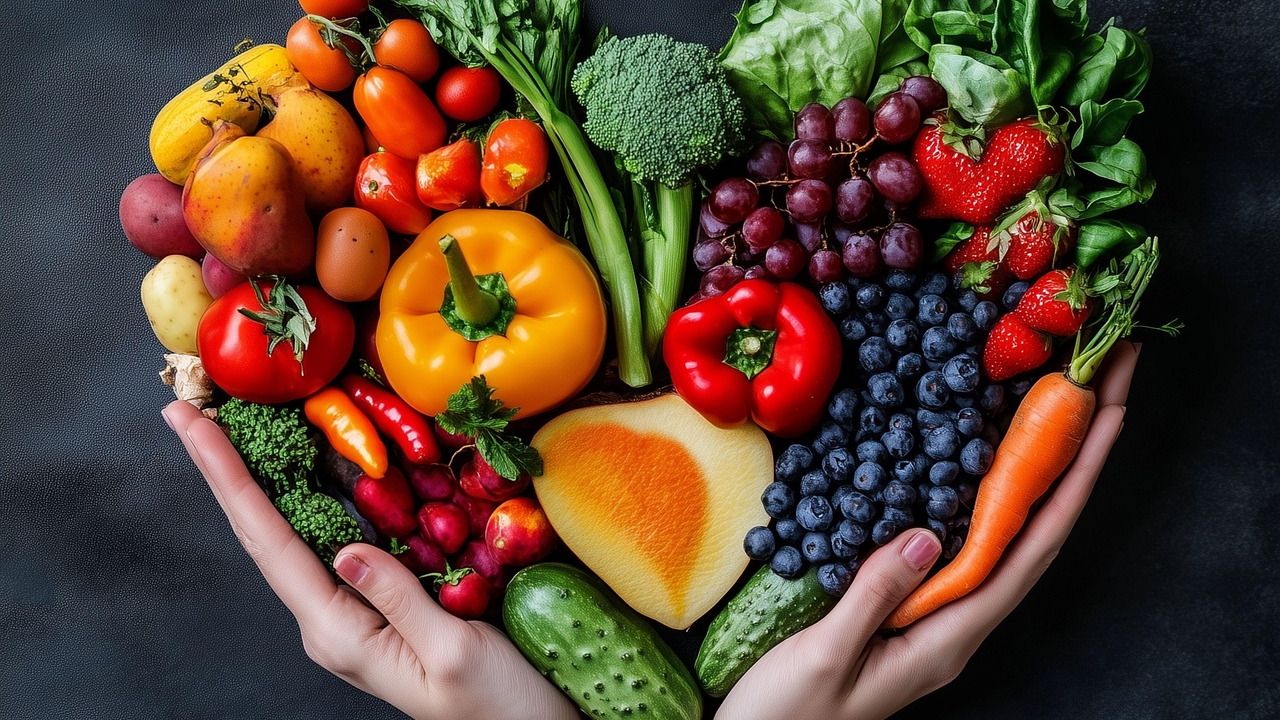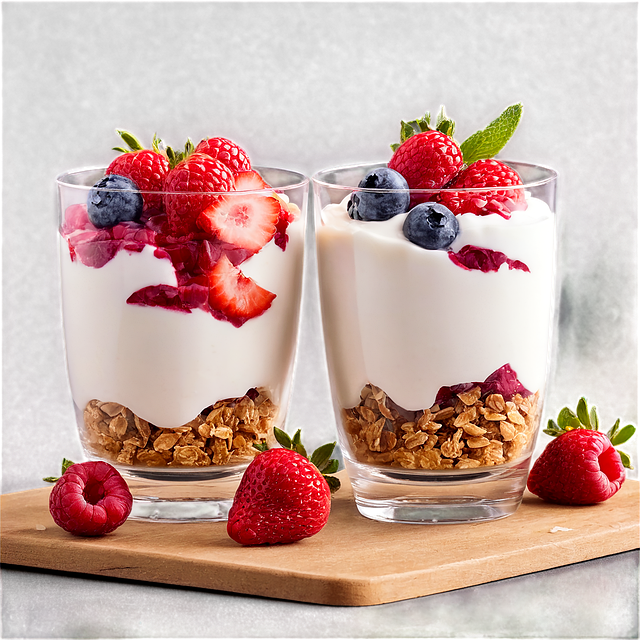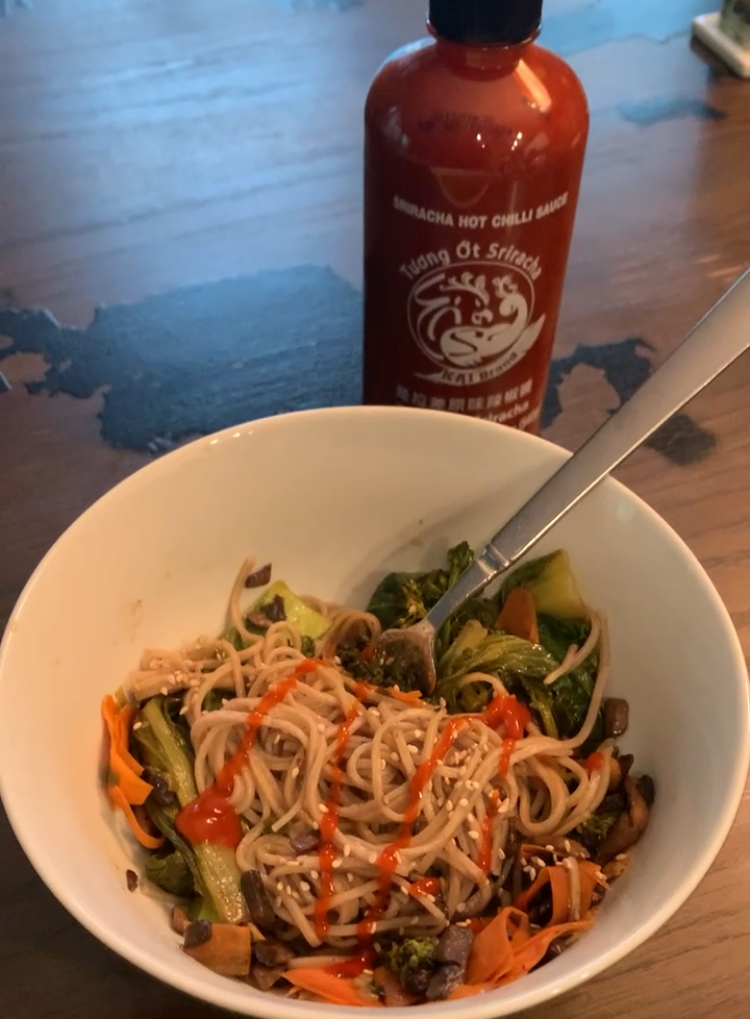
How to Cook Healthy When You've Got No Time
I get it. Life is busy.
One thing I don't compromise on when I'm busy is eating healthy. (Things I'm willing to compromise on: volunteering - my automatic response to most things is "No"; cleaning; watching TV / social media.)
Why is healthy eating unnegotiable for me?
Because, when I don't eat well, I don't feel good.
It's as simple as that.
It's not for losing weight. It's not because of certain beliefs.
It's because INPUT affects OUTPUT.
If you want to have
- energy
- less inflammation
- better metabolism
- good digestion
- clear thinking
then it's time to decide you will NOT compromise on eating healthy.
Now that that's clear, let's talk about HOW to eat healthy when you're on a time budget.
STEP 1: PLAN IT OUT

Start with breakfast because we usually end up eating the same thing or rotating through a couple of things for breakfast every day.
What are your breakfast go-to's?
Mine are:
- Plain yogurt - stir in protein powder, (organic, unsalted, plain) peanut butter, a cut up Lara bar (or fresh fruit), and museli. Approximate time ~ 2 minutes.
- Egg tacos: I use Cassava tortillas by Siete Foods, warm those up in a pan w/ butter, adding a bit of grated, organic and raw cheese at the end. Next, I cook some torn kale leaves in a little more butter. When the kale is slightly wilted (1-2 minutes), add 2 eggs and scramble. Add salt and pepper. When it's cooked, add the egg and veg mixture to the tortillas. Add salsa if desired. Approximate time ~ 5 minutes.
- Banana pancakes: This is NOT a low-carb recipe so I try not to have it too much, but I do love pancakes. This recipe has no sugar other than the banana and syrup if you choose to add it at the end. Smash up 1 or 2 very ripe bananas. Mix with 1 egg, 3/4 cup milk, 1/4 teaspoon salt, 1 Tablespoon baking powder, 1 teaspoon cinnamon, and 1 cup of flour (I use gluten free or Einkorn ancient grains organic wheat). Cook like a pancake! I top mine with peanut butter and molasses, but you do you. Approximate time ~ 10 minutes.

With this in mind, on my weekly grocery list, I make sure we have
- Plain yogurt
- Grass-fed Butter or Ghee
- Fruit
- Eggs
- Leafy greens (I keep some type of lettuce leaf on hand as well as a more savory green I can cook like kale, spinach, or collard greens)
- Milk (I get raw - unpasteurized - or Milkadamia / Ripple)
- Peanut butter (organic, no oil / sugar / salt added if possible) or other nut butter
- Salsa
- Pantry basics - sea salt, spices, baking powder, etc.
For lunch and dinner planning, I think about (1) what sounds good, (2) what's in season, and (3) what do I feel like making (or NOT).
Let's say we're planning on making a big pot of soup this week, a stir-fry, and a 1-pan meal. If you make a big enough batch for your family's needs, this may be enough for the whole week, cooking-wise.
STEP 2: HAVE 5 GO-TO EASY RECIPES
If you're not familiar with cooking, there is work involved in this step.
Once you've made something 10 times, you'll eventually memorize it. That's when it becomes a beautiful thing.
I say "have 5," because you only need a handful of easy, nutritious recipes to fill in the gaps between other meals you cook; eating out; and events where food is provided for you.
My easy recipes include:
- 1-pan meat and veggies - pick a protein (chicken thighs or breasts; sausages; etc.) and pick 1 or 2 veggies (sweet potatoes; broccoli; brussel sprouts; carrots; etc). Cut the veggies into 1/2" - 1" pieces. Toss with 1 Tablespoon olive oil and a bit of salt and pepper or seasoning. Lay them onto the sheet pan. Nestle the meat in there and cook for 30-40 minutes (check halfway to toss, and close to the end for doneness) at 400 degrees in the oven.
- Stir-fry - same idea - pick a protein (ground beef, lamb, turkey, tofu, etc.) and 1 or 2 veggies (squash, cabbage, mushrooms, etc). Cook the protein in a pan on med-high. Remove from pan, add a bit more butter to the pan and cook the veggies until softened. Add the protein back in, add a sauce for ~2-3 minutes until thickened. Eat on top of rice, soba, or quinoa. I make my own sauce - it's SO easy (recipes are all over online*) and I think tastes better, but a pre-made sauce is totally fine too.

- Crockpot Stew - crockpot meals are a gift you give to future you. Brown the seasoned (salt and pepper or whatever you prefer) protein in a med-high skillet for 2-3 minutes with butter, then put it in the crockpot with 1-2 raw veggies of your choice. Add about 1 cup of sauce or broth. Cook on low. When you get home at the end of the day - dinner is served!
- Salad - a hearty salad is so enjoyable when it's hot out. I try not to turn my oven on in the summer. 🥵 I use a combo of butter leaf, red leaf lettuce, or kale; kimchi or cooked, sliced beets; sometimes candied nuts; goat cheese; avocado; hard-boiled eggs; radishes or cucumbers; or whatever is in my refrigerator! Topped with a bit of my new, favorite dressing: Bragg's ACV Vinaigrette.
- Ramen - I buy pre-made noodles because I'm not a total psycho! Also, I buy pre-made bone broth, but you do what works best for you. My go-to ramen broth recipe I've been loving is this: heat 4 cloves of minced garlic, 2 inches of grated ginger, and 1 T sesame oil in a large pot on medium heat. Cook, stirring until fragrant, ~ 1 minute. Stir in 4 cups broth (I use a combo of bone and veggie), 1 teaspoon chili paste, and 1/4 cup of miso. Bring to boil. Reduce heat to simmer 5 minutes. Taste w/ 1 tsp sea salt (I usually also add 1 Tablespoon of soy sauce/tamari). Cook the noodles in a different pot. When it's all done, divide it into bowls and top with sliced green onion, radishes, sliced beef, or hard-boiled eggs. I sometimes cook spinach, mushrooms, or kale into the broth as well.
Other things I'm adding to my grocery list, if we're low or out of them may be:
- Miso, Soy Sauce / Tamari, or pre-made sauces
- Garlic, Ginger, Green Onions (I use these ALL the time, so just plan to keep them in stock)
- Rice, Noodles, or Quinoa (whole grains)
- Goat cheese
- Avocado, Radishes, Beets, Cucumbers, Mushrooms, Sweet Potatoes, Broccoli, or whatever looks good at the market that week. I base my meals on the veggies - this is an important part of healthy eating!
- Bone and Veggie Broths
- Organic Proteins (ground meat, chicken, tofu, eggs, nuts, beans, etc.)
STEP 3: ACTION
Now that you have your planned meals and groceries, don't forget to use them!
If it's a busy day, or I'm tired or stressed, I don't make something time-consuming or hard. "Breakfast for dinner" it is. Or heating up last night's dinner. Or a quick salad. Or a sandwich (with TONS of veggies in there - I use saurkraut, pickles, pesto, sprouts, cucumbers, etc.)
Don't make it hard on yourself.
But also, feed yourself well.
Download our free "Easy Grocery List" here.
* my go-to stir fry sauce: 1/2 cup bone / veg broth + 1/3 cup tamari / soy sauce + 1 Tablespoon rice vinegar + 2 teaspoons sesame oil + 2 cloves garlic (diced small) + 2 teaspoons grated ginger + 1 Tablespoon cornstarch (makes it thick)
One other nice side-effect of eating and cooking at home more is your food bill will go down significantly. Yes, groceries can be expensive. Especially if you're buying high-quality ingredients, but eating out is SO much more expensive. Not to mention the sky-high health care costs associated with eating poorly.
I like to say you can pay now with good quality food or pay later with poor health and the expenses associated with that (copays, deductibles, medications, pre-existing conditions, denied claims, ER visits, hospice ....). THAT is expensive. Organic eggs in the long-run, are quite cheap in comparison. :)
Don't miss a beat!
New moves, motivation, and classes delivered to your inbox.
We hate SPAM. We will never sell your information, for any reason.
